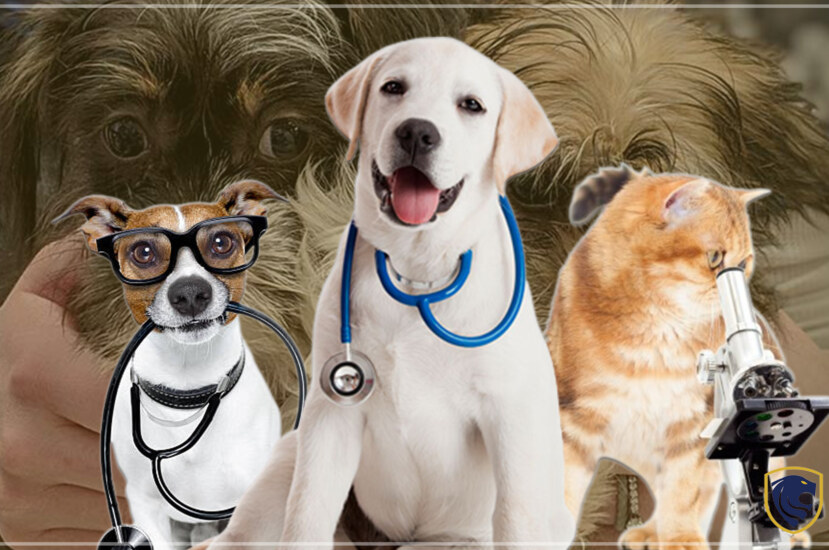Veterinary care – An Introduction
Veterinary Medicine can be defined as the branch of medicine, that deals with animals. Here, titles such as prevention of diseases, Management of well-being, diagnosis of diseases, and varied treatment used to eradicate illnesses such as diseases, disorders and injuries which can be harmful to animals are subjected to the discussion. Therefore, it can be defined as a service that deals with animal health and welfare.

How does the veterinary service get its name?
The term “veterinary” came from the Latin word ” veterinae” which means” working animals “.
“Vet” is an abbreviation, commonly used for veterinary service or veterinarian surgeons, in some countries except the United Kingdom, and Ireland. But now, the rest of the English-speaking world referred to it as veterinarians.

The history of veterinary care
In ancient times, veterinary service was focused on treating horses, who were used heavily for military services. When on the battlefield, horses get injured, warriors required a method of cure for the horses to get them back to the war. With the lapse of time, the method of curing animals spread out to cattle and then to dogs and the whole livestock and exotic animals were able to get benefitted from veterinary care. James Harlan Steele is considered the father of veterinary medicine.

Contributors of veterinary service
According to the reports of the American Veterinary Medical Association (AVMA ), veterinary medicine would not exist without the contribution of Dr Claude Bourgelat. He has established the first veterinary school in France in 1761 and the recognition and reputation towards veterinary care were built after.
At the same time, French chemist, Louis Pasteur is a remarkable character in the veterinary field. Moreover, he was the first, who had conducted laboratory-based scientific investigations to reveal the secrets of animal vaccination, innovated vaccines which saved the lives of thousands of animals and most prominently brought limelight to the veterinary service. The vaccine developed for chicken cholera in 1879 and the other for anthrax of sheep and cattle in 1881 are the most significant work of Pasteur.

Veterinary care, for whom?
Veterinary doesn’t only deal with diseases that can be caused to animals. It also caters to animal nutrition, rearing animals, breeding, husbandry and animal product development.
One might think that veterinary care benefits only domestic animals. Wild animals as well as domestic animals get the benefit of having veterinary services. Having regular veterinary care is much beneficial for the maintenance of health, and the prevention of transmitting diseases from animals to humans.

What do you get from a veterinarian ?
If you feel that your loving pet is showing a different behaviour, it tells you he needs immediate veterinary aid. When you take your furry friends to the animal hospital, you will meet a set of services.
Firstly, your pet would subject to physical examinations to detect the injury or the illness and will be given medicine. If the case is serious, your pet will have to face several lab listings and other diagnostic tests. Also, veterinary services provide your pet with vaccines, which should be given annually or within the appropriate time-bound. Moreover, if your furry friend has a parasite infection you will have an idea of the correct treatment.

Veterinary science is not a sector that cures the physical illnesses of animals. Behavioural and thinking disorders of animals also can be cured by a veterinarian. If your pet is too noisy and overly active, it will be provided support in behavioural counselling. In addition, training and getting socialised in a new environment.
Further, awareness of the diet and nutrition of your pet will provide you with an idea of healthy feeding and veterinary also focused on dental health and cleaning of the animals.
Meet your veterinarian
At the animal hospital or the veterinary centre, you will meet different types of veterinarians. Some of them are, veterinary specialists who are dealing with the specific illnesses of animals both domestic and wild, Food-animal veterinarians, Food safety and inspection veterinarians, Research veterinarians and a few other professionals that work in veterinary care. They bear the responsibility of protecting animal health as well as human.
The duties fulfilled by the veterinarians are as follows.
Examine the animals to reveal the problem they have as injuries, disorders or other illnesses.
Dressing wounds and providing medicine.

Doing surgeries when necessary
Performing Vaccinations and other testings
Operating medical testings such as x-ray machines and scan machines
Conducting awareness programs to advise animal owners about general care, medical conditions, and treatments.
Need of veterinary care
Examining, revealing and healing the disease, are the main responsibilities of a veterinarian. You might think that dealing with animals is a simple task. But think how hard it would be to deal with someone who can not express their ideas or even utter a word! Nevertheless, veterinarians take this challenge and do as much as they can to cure animals. They consider animals and humans in an equal manner, easily understand what their gestures say and help them to overcome their illnesses.

Cause for the higher cost of veterinary services
A veterinarian visit will cost nearly 45 – 55$ anywhere, but a more deep check on your pet will cost from 100 – 300$. An equivalent physical check-up for your cat will cost 90 – 200$ all around the country. Veterinarians have to cover all the travelling charges themselves with the high cost. At the same time, they have to spare a higher cost in Personal Protection Equipment, which is necessary. The ones who are handling private veterinary businesses have estimated a margin of charges for each clinic such as about 10% for small hospitals, and above 15% for special practices and emergencies.
In the field of veterinary medicine, the highest cost would be spared for equipment. Same to human hospitals, animal hospitals also have machines and equipment costs so much money to buy and maintain. Radiology equipment, x-ray machines and ultrasound machines can be indicated as examples.

Veterinary is a field that considers broadly animal health. Except for this higher machinery cost, veterinarians have to pay the wages of their staff, nurses, assistants, receptionists and others. Also, in comparison to a hospital that treats humans, the quantity of animal patients is low. So the vets have to cover all their expenses on these less number of animal patients.
If you are maintaining a furry friend, you have to bear different costs such as food, vaccines and routine care, Heartworm and flea prevention, Vitamins, License, Treats, chew toys and much more! Therefore, it will be not difficult for you to perceive why providing veterinary care for your pet cost much.




